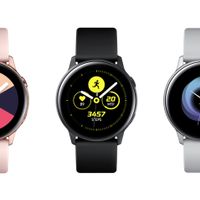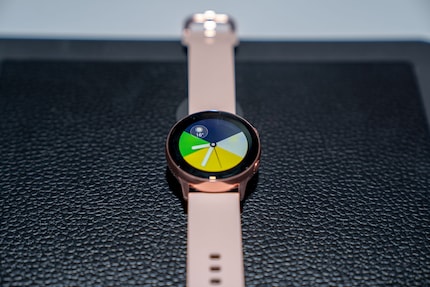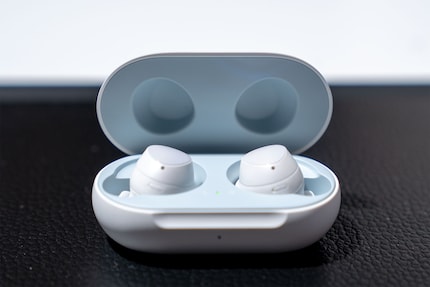
New to our range


Are wearables the future? Perhaps they are! At the Unpacked Event in London, it was clear that Samsung is venturing into an untapped market.
S10 this, 5G that. It was all about smartphones at the Samsung Unpacked Event in London. The questions revolved almost exclusively around mobile phones. But that's not all. On the fringes of all the fuss, Samsung showed off some new wearable devices, just like that, "in the nick of time."
Samsung's connected objects make it easy to spot trends. That's why they shouldn't be ignored.
For its watches, Samsung continues to rely on the Exynos 9110 SoC (system on a chip), and for good reason, one of the new connected watches present at this event - the Samsung Galaxy Watch Active - is equipped with it. At first glance, this isn't a conventional Samsung smartwatch; the marketing messages talk about sport and everyday sportiness.

The Galaxy Watch Active records data about your sleep and general health, among other things. This device is supposed to become a "personal trainer."
As much as I love technology and gadgets, I remain sceptical of claims mentioning a device taking the place of your personal trainer. Sure, a smartwatch can get you to walk a few more steps a day, or take the stairs. But it's no substitute for a real coach. Because coaching is much more than recording certain data and providing automated advice, with or without access to the cloud. Coaching requires humanity, empathy, humour and the ability to understand the psychology of the person being coached. Watches are not capable of this.
But they do help with daily training. They record data that is difficult to measure under normal circumstances. A coach can then interpret this data, adapting it to you as an individual to optimise your training and nutrition. That's the role of a coach after all.
But back to the hardware of the Samsung Galaxy Watch Active! It measures just over 1 centimetre thick with a diameter of 40 millimetres and a battery with 96 hours of autonomy. That doesn't sound too bad.
This watch is connected to the Samsung ecosystem. I'm still not entirely convinced by this kind of technology. Sure, I can see how there might be a benefit to your phone telling your washing machine that you're on your way home. But all that data about you could fall into the wrong hands - hackers, advertisers, big business - and have disastrous consequences. The watch also features the Bixby voice assistant, available in German, French and Italian. An attempt to conquer the Swiss market?
The new Samsung trackers, the Galaxy Fit and Fit e, are somewhat curious objects. Apart from being expensive, it's not clear to me what they can be used for. Their functions are similar to those of the Samsung Galaxy Watch Active without the cloud connection.
These tracker bracelets aren't dumb. Like the watch, they automatically recognise certain activities and allow you to choose others manually. Their other assets? The stress management function, as on the watch, and a battery life of 168 hours.
We've pretty much come full circle. While they look pretty solid, they don't break any bricks either. Trackers are already struggling to break into the market. They're too small to carry more technology and more sensors. And every year, we're good at replacing them. Samsung, too, seems keen to get in on the act, just because others are.
Soon or later, trackers will be part of a niche market, and still. The big players in the sector - such as Fitbit - don't really seem to believe in hardware any more and are gradually shifting their business model towards 'Health as a Service'. Samsung will surely follow suit when the opportunity arises. After all, why should we believe in a product doomed to die?
Samsung seems to believe so little in the new trackers that they're not even on display at Tobacco Dock in London. Watches, they were there; tablets, too; all versions of the S10, same; headsets, that goes without saying, trackers, well no. Ah, so it all makes sense.
When Apple does something, Samsung does it too. And vice versa. It's understandable, because what Apple users get, Android users want too. And vice versa.

It's understandable that Samsung also wants to produce in-ear headphones. A few years ago, the Gear IconX should have solved this problem, but they weren't as successful as the AirPods. Samsung logically wants to make money with these headphones. After all, that's why their employees get up every morning to go to work. The Galaxy Buds are meant to do just that.
Samsung attaches importance to integration with their ecosystem. The Galaxy Buds support Bixby, Google Assistant and Siri. The microphones used for voice assistants can also be used for phone conversations. The speakers are by AKG. The former Austrian audio equipment group has been taken over by Harman Kardon, a company owned by Samsung for just over two years.
An ultra-short test - simply putting the headphones in your ears and listening to music - showed that these headphones are identical to their predecessors, but much lighter. Isolation from the outside world is decent, but the volume isn't enough to drown out outside noise. That's not to say that the Galaxy Buds aren't capable of this, as I was at London's Tobacco Dock with over 1,000 journalists, bloggers, influencers and VIPs all hovering around the Buds earbuds and the watch.
The Galaxy Buds charge wirelessly after five hours on the phone. 15 minutes of charging gives an extra 102 minutes of battery life. The new Galaxy smartphones can be used to charge connected objects. Practical, isn't it? And cleverly orchestrated. On a market scale, the Galaxy Buds show where the potential lies. Not on your wrist, unless you're an athlete, but in your ears. When voice is the key to controlling your connected world, a microphone needs to be close to your head. So why not a headset, you might ask? That's precisely why Samsung has taken over the audio hardware business. Not just for the few francs in profit that comes with it.


Journalist. Author. Hacker. A storyteller searching for boundaries, secrets and taboos – putting the world to paper. Not because I can but because I can’t not.